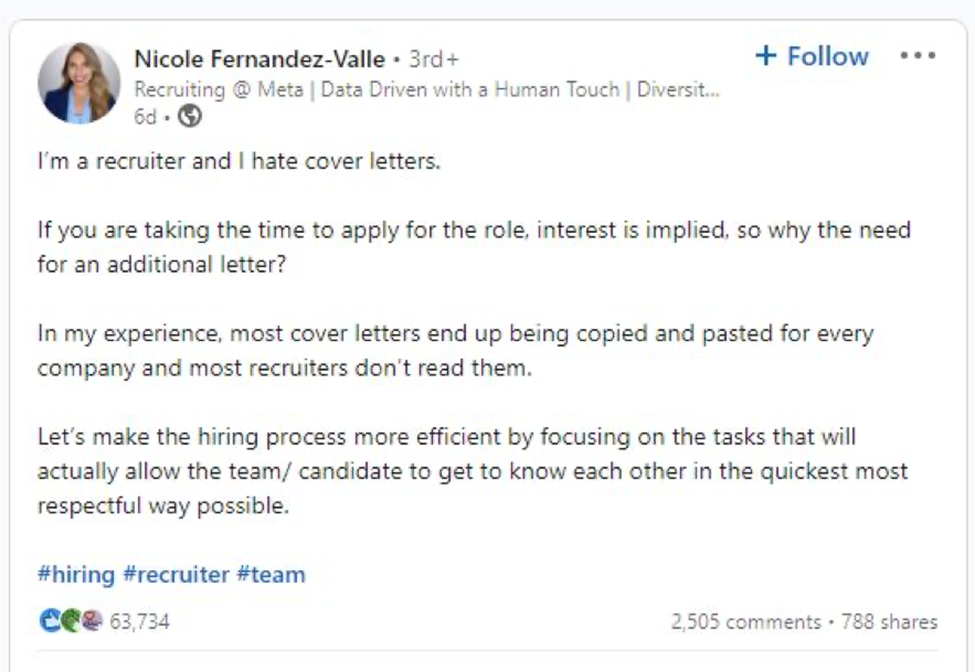At RIAs, they’re an indispensable way to find out more about potential hires than what’s just on a resume.
While scrolling through LinkedIn recently, I came across a headline, “Recruiter shreds cover letters.” When I clicked on the headline, I found this post by recruiter Nicole Fernandez-Valle of Meta.

I couldn’t disagree more. While not a professional recruiter, I’ve had my hand in hiring for 14 years now and have advised many of our clients on their process. In the wealth management industry, I strongly feel a cover letter should be a requirement for the application process. More often than not, I base my decision to interview a candidate solely on the cover letter, with only a cursory review of the resume. Here are the four reasons I find cover letters crucial to the hiring process:
- Example of Candidate’s Writing Ability
Email is the primary mode of communication with clients today. Regardless of an employee’s specific role within your RIA, they must possess the ability to communicate via the written word. If a candidate can’t coherently and concisely answer the relatively simple question of, “Tell me about yourself and why you think you’d be a good fit for this role at our company?” they probably won’t be able to provide instructions to a client on how to open their account or add an outside account to their performance report, etc. If a candidate displays poor writing in their cover letter, I move on to the next applicant, without ever looking at the resume.
- Proof of Candidate’s Interest in the Position/Company
With job boards like LinkedIn, Indeed.com, ZipRecruiter, etc., it is very easy for an applicant to simply click “apply” on any and all job openings they come across. By requiring a bit more work on their part, you are weeding out people that aren’t really interested in the position or in the wealth management industry. Ms. Fernandez-Valle states, “Most cover letters end up being copied and pasted for every company,” and that’s the point, exactly. I want to see they’ve customized the cover letter specifically to the job opening. I look for words/phrases they’ve pulled from the job description, or reference to something they saw on our website. I want to know they are truly interested in working at our company. Applicants that can write coherently and have put in the extra effort to demonstrate they’ve done their due diligence on our firm and the role they are applying for, go to the top of the list.
- Proof the Candidate is Detail Oriented
Every job description states, “Qualified candidates must be detail oriented,” but that’s sometimes hard to prove during an interview. By stating in the job description that a cover letter is required as part of the application, you can immediately weed out those candidates who obviously didn’t read carefully. Several years ago, when I was frustrated by the number of applicants that weren’t submitting cover letters, I was told, “You can’t really blame them—you put the cover letter requirement at the very end of the job description. Do you expect them to read the entire document?” Why yes, yes I do. If this candidate can’t complete a two-page job description, I know right away that they won’t be able to service our clients at the level of detail we require. In many ways, the requirement of a cover letter works similarly to Van Halen’s famous contract rider requiring concert venues to remove all brown M&Ms from the backstage area—if the band walked in and saw brown M&Ms, they knew immediately the venue didn’t read the complicated specifications for the stage setup and the necessary steps to ensure the band’s safety during the show.
- Allows the Candidate to Tell a Story Beyond Bullet Points on Their Resume
Many RIAs are small businesses, employing 10 to 20 employees. Culture is critical to all businesses, but the impact to culture when you are hiring your 13th employee vs. your 113th employee is huge. Therefore, it is essential RIAs get to know their candidates on a personal, as well as professional level during the hiring process. By providing someone the opportunity to tell a story in paragraph form on a cover letter, rather than through bullet points on a resume, it allows you one more avenue to learn about the candidate’s personality, as well as their experience. When Danny Chajon applied at PFI Advisors, he was able to tell us, in his cover letter, that his wife works in operations for a $4.5 billion RIA. While that doesn’t speak to his level of expertise, it told me that he was familiar with our industry and the trials and tribulations of our clients (RIA operations professionals). While we didn’t hire him solely on that fact, it told me that he was someone worth interviewing. I never would have known that fact based on his resume alone.
For the reasons stated above, I have found cover letters to be an incredibly important component of the hiring process. I was quite shocked at Nicole Fernandez-Valle’s point of view, especially considering that she must see hundreds, if not thousands, of resumes at Meta. I would think an easy screening tool like cover letters would be invaluable to her. For my hiring process, a cover letter is indispensable, and I strongly encourage you to incorporate them into your process as well.
This article originally appeared on WealthManagement.com.

